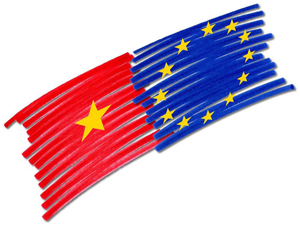Vietnam-EU Free Trade Agreement Expected by Late 2014
 Nov. 18 – Vietnam and the European Union (EU) appear set to finalize and sign a free trade agreement (FTA) by as early as fall 2014.
Nov. 18 – Vietnam and the European Union (EU) appear set to finalize and sign a free trade agreement (FTA) by as early as fall 2014.
After the fifth round of negotiations on the FTA were held in Hanoi from November 4-8, both sides expressed a strong commitment to successfully concluding negotiations ahead of the tenth Asia-Europe Meeting (ASEM 10) next fall. Following the negotiations, the European Parliament held its second hearing on the proposed FTA in Brussels on November 12.
With negotiations on the proposed FTA beginning in June 2012, this marks the first time both parties have expressed a clear political commitment to the FTA’s ultimate ratification.
 RELATED: Dezan Shira & Associates’ Asia Business Model Comparison Services
RELATED: Dezan Shira & Associates’ Asia Business Model Comparison Services
At the FTA hearing in Brussels, the Chief Negotiator for the EU’s delegation Mauro Petriccione announced that consensus had been reached on creating a level playing field for the private and public sectors, intellectual property rights, geographic indication and sustainable development. Petriccione also hailed Vietnam’s recent efforts to improve trade and investment regulations, and characterized the proposed FTA as the EU’s gateway to approaching other ASEAN countries in the future.
Leaders from both sides are also scheduled to meet informally in sideline meetings and online conferences to address technical matters.
With a bilateral turnover of nearly US$30 billion in 2012, the EU is currently Vietnam’s largest export market and the country’s second largest trade partner. In turn, Vietnam is the EU’s fifth largest trade partner. During the first half of this year, bilateral trade between Vietnam and the EU rose sharply as Vietnamese exports to the EU increased 25 percent and EU exports to Vietnam by 20 percent.
The EU is also close to concluding FTA negotiations with several other ASEAN countries including Singapore, Thailand and Malaysia. An EU FTA with Singapore is expected to be ratified next year and will come into force in 2015. Agreements with Thailand and Malaysia, however, remain in the early stages of negotiation.
Vietnamese Concerns
The proposed EU-Vietnam FTA will eliminate tariffs on 90 percent of Vietnamese goods, and cut the average import tax by 10-20 percentage points on the remaining 10 percent of goods – currently set at 4.1 percent. Presently, Vietnamese exporters pay high duties on certain items: 10.8 percent on seafood, 12.4 percent on footwear, and 11.7 percent on garments.
Some, including the former director of the Vietnamese Trade Research Institute Nguyen Van Nam, fear domestic firms could be harmed by the agreement.
“Vietnamese firms may lose even at home since many EU industrial and service products have a competitive advantage,” he stated.
According to Van Nam, the industries most at risk include meat and animal feed manufacturers.
“If Vietnamese firms do not improve their management and technologies and restructure production in the next one or two years, many of them, under pressure of cheap imports from the EU, will face bankruptcy,” Van Nam further stated.
 RELATED: Dezan Shira & Associates’ Business Advisory Services
RELATED: Dezan Shira & Associates’ Business Advisory Services
Nguyen Van Tuan, Deputy General Secretary of the Vietnam Apparel and Textile Association, said that stringent EU conditions regarding certificates of origin for materials means many local firms will be unable to make use of the tax reductions outlined in the FTA. According to Van Tuan, the garment industry’s reliance on imported feedstock from China, Taiwan and South Korea prevents manufacturers from meeting the EU’s stipulation that exports be fabricated with local materials.
“Few Vietnamese firms can complete the business cycle from designing and producing products, to exporting them,” he argued.
Similarly, 70 percent of exports in Vietnam’s footwear industry are also reliant on outsourcing contracts.
Despite these criticisms, a recent study by the EU’s Multilateral Trade-related Assistance Program (Mutrap) estimates that the proposed FTA will increase exports of major Vietnamese products to the EU by 10-20 percent.
European Community Delegation
Last Wednesday, a delegation from the European Community led by Antonio Tajani, Vice-President of the European Commission, further strengthened European ties with Vietnam in economics, trade, investment and tourism.
Vietnamese Prime Minister Nguyen Tan Dung personally met with the delegation that consisted of EU officials and representatives from 40 European businesses and media agencies.
“Vietnam hopes to shake hands with the EU in all aspects, particularly economics, trade, investment, tourism, and ODA,” he said.
He also called on the EU to recognize Vietnam’s full market economy status, early approval of the Vietnam-EU Partnership and Cooperation Agreement (PCA) and the signing of the FTA.
You can stay up to date with the latest business and investment trends across Vietnam by subscribing to Asia Briefing’s complimentary update service featuring news, commentary, guides, and multimedia resources.
Related Reading
Vietnam, EU Continue FTA Negotiations
Vietnam-EU Free Trade Agreement Negotiations Continue
Vietnam, EU Announce Free Trade Negotiations
- Previous Article Vietnam to Introduce Digital Signatures for Customs Declarations
- Next Article City Spotlight: Hanoi









